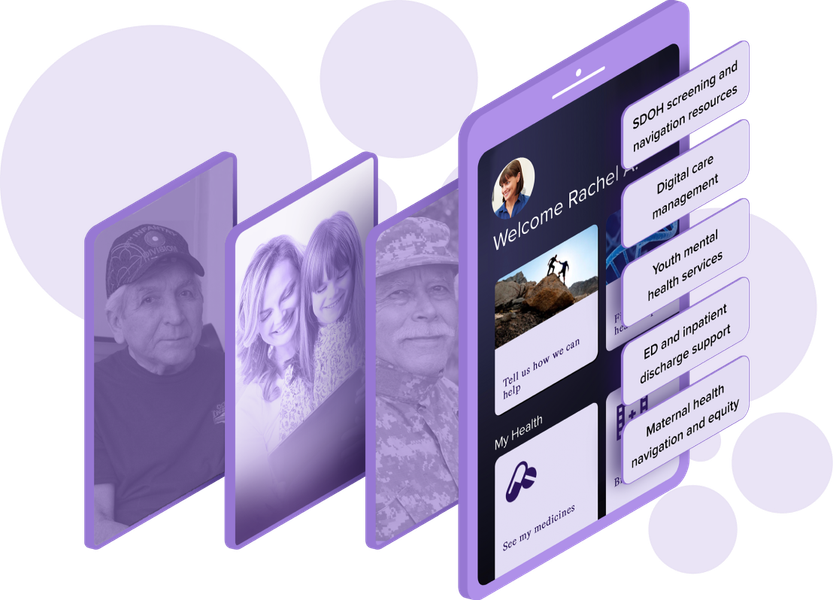The context: When your internal team hits a wall
Get Well isn’t just another healthcare tech company. For 25 years, they’ve been the go-to patient engagement solutions provider for major hospital systems. Think 1,000+ employee healthcare networks that need serious digital transformation.
But here’s the thing: even experienced teams need a fresh push sometimes.
When Get Well first reached out to us, they were ready to take things up a notch.
They had a solid goal: get in front of enterprise-level hospitals and expand beyond their usual entry point, nursing leadership, into harder-to-reach roles like CIOs and Clinical Operations Directors.
Their in-house BDR team knew the product inside and out, but they weren’t getting the traction they needed with top-tier decision-makers. So, Get Well hit pause and brought us in to realign the strategy and take their outreach to the next level.
We analyzed their current situation and discovered several other challenges they faced:
- Narrow persona targeting. Their internal team could book meetings with nursing staff but struggled to break into IT, population health, and C-level executives.
- Account-based limitations. They had a strict list of ~200 target hospital accounts they wanted to focus on.
- Complex product positioning. Multiple products for different buyer personas made messaging incredibly challenging. They struggled to resonate with their prospects.
- Security roadblocks. Healthcare’s regulatory environment meant lengthy approval processes for everything, extending their sales cycle.
“We had solid tech and a powerful mission, but we couldn’t get into the rooms we needed. Belkins helped us change that.”
— VP of Marketing, Get Well
The strategy: Omnichannel, account-based, all-in
We saw that traditional outreach wasn’t working here. So we built a fully aligned outreach ecosystem where every touchpoint was meaningful and flowed naturally from the previous one.
Here’s how we approached it:
Laying the foundation with deep product acquaintance (month 1–1.5)
Before sending a single message, we invested serious time in understanding Get Well’s world. This wasn’t your typical 2-hour onboarding call.
What we actually did:
| Extended onboarding | In healthcare, fast ramp-up can have consequences. That’s why we dedicated 20+ hours of product training across multiple sessions to truly understand how to communicate its value. |
| Persona development | We mapped 4 distinct buyer personas across IT, nursing, population health, and community care, thus expanding our reach to more people from the buying committee. |
| Competitive analysis | To highlight Get Well’s strengths, we took a deep dive into how they differentiated from their key competitor, Epic, and a number of smaller players. |
| Account research | We enhanced their target list with advanced healthcare system mapping. |
By the end of onboarding, our team could speak fluently about care plans, patient engagement workflows, and EHR integrations — as if we’d been in healthcare for years.
Designing complementary always-on + event-driven campaigns (month 1–ongoing)
We created and launched two basic campaign types that worked in perfect alignment:
1. Always-on campaigns with a layered approach:
- A title-based campaign tailored to each hospital’s EHR, showcasing Get Well’s Full Patient Journey capabilities and how they map to specific systems like EPIC.
- Individual campaigns for specific offerings, allowing stakeholders to see the value in each solution on its own. For example, an activation campaign targeted at population health personas.
Here’s an example of a message we were sending within one of those campaigns:

2. Event-driven campaigns, perfectly timed around industry events:
- Pre-conference outreach: Targeting attendee lists 2–3 weeks before major conferences
- Post-conference follow-up: Re-engaging warm leads with relevant content, based on the insights gathered during the trade show
- Webinar campaigns: Pre- and post-webinar sequences for Get Well’s own events
- Personalized tier-1 campaigns: Custom messaging for their top 20 dream accounts
Below is an example of a post-conference email:

Channel orchestration: Where the magic happened
Given the regulatory compliance requirements, setting up the perfect infrastructure and combining different communication platforms was a real challenge. Still, we managed to create a system that worked seamlessly and ensured smooth transitions between channels.
- Email: The primary workhorse for cold outreach and nurturing
- Leveraged Get Well’s domain and custom mailboxes for maximum deliverability
- Segmented messaging by persona and product fit
- Launched advanced A/B testing on subject lines and CTAs
- LinkedIn: Strategic relationship building
- 4 sales rep profiles for authentic, relationship-based outreach
- Warm-up sequences before connection requests
- Tier-based targeting using our proprietary LinkedIn activity scoring
- Calling: The conversion accelerator
- High-volume prospecting by our specialist
- Strategic follow-ups by account managers when prospects showed engagement
- Booked C-level meetings through gatekeepers
Here’s a part of the flow we built for you to get an idea of how it worked:

The integration secret: When someone didn’t respond to an email, we’d check their LinkedIn activity score. High activity? LinkedIn outreach. Low activity? Straight to cold calling. If they engaged but didn’t convert? Call them within 24 hours.
What held us back (and how we solved it)
Outreach is never easy, but it’s even harder in highly regulated industries like healthcare. Here are the key challenges we faced and how we overcame them.
Challenge #1: Complex healthcare research
The problem: Healthcare systems are massive, with 40+ hospitals under one umbrella and inconsistent email formats.
Our solution:
- Manual research to map hospital hierarchies and find the correct contact information
- Cross-referencing multiple databases beyond Apollo
- Domain investigations for each health system’s email patterns
- Leveraging our proprietary technology for LinkedIn activity scoring
Challenge #2: Regulatory compliance and security
The problem: Healthcare’s strict security requirements delayed everything from mailbox setup to content approval.
Our solution:
- Background checks for our team members
- Working within their compliance framework rather than fighting it
- Using Gmail workarounds when their IT couldn’t create dedicated mailboxes
Challenge #3: Multi-product positioning
The problem: Get Well has multiple products that appeal to different personas, which requires surgical precision in messaging.
Our solution:
- A product-persona matrix, mapping each solution to specific buyer roles
- Separate campaigns for each product line
- Dynamic messaging based on the prospect’s role and hospital needs
- Competitive differentiation messaging against Epic
Challenge #4: Event-based opportunity identification
The problem: Healthcare conferences drive massive engagement, but attendee lists are expensive and hard to find.
Our solution:
- Creative sourcing of conference attendee lists through industry connections
- Social media mining for conference hashtags and engagement
- Pre-event relationship warming-up campaigns
- Post-event follow-up sequences with conference-specific messaging
Why this approach worked
Account-based precision
Unlike mass outreach, every message was crafted for Get Well’s specific buyer personas. We couldn’t expand beyond their 200-account list, so we made every interaction count.
True omnichannel integration
Most agencies run separate email, LinkedIn, and calling campaigns. We built an ecosystem where each channel informed and enhanced the others.
Healthcare industry expertise
Our team became Get Well insiders, understanding EHR systems, patient engagement workflows, and hospital buying committees better than most internal teams.
Event-driven amplification
Healthcare moves around conferences and industry events. By timing our outreach around these moments, we caught prospects when they were most receptive to new solutions.
What’s next: Scaling the success
With proven processes and expanded persona reach, Get Well now has:
- A replicable system for breaking into new hospital accounts
- Proven messaging frameworks for each buyer persona
- Event-based campaign playbooks for maximum ROI
- Multi-channel integration that their internal team couldn’t achieve
The lesson here? When you combine deep industry knowledge with true omnichannel orchestration, you can break through even the most challenging B2B environments.



